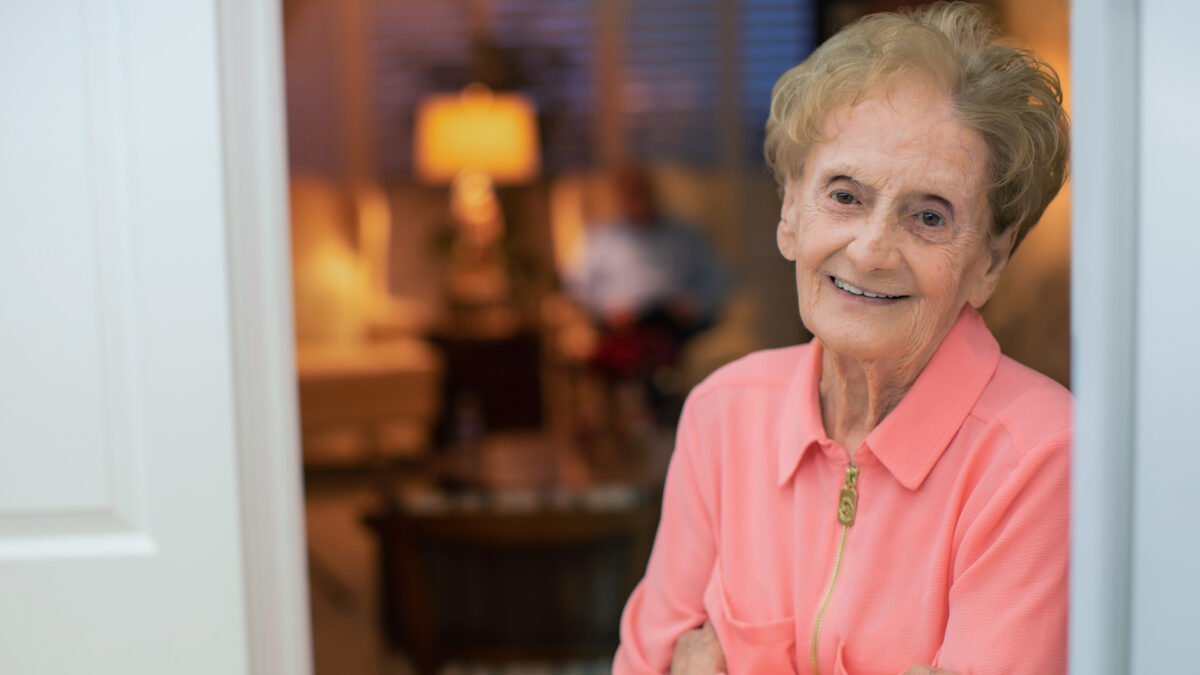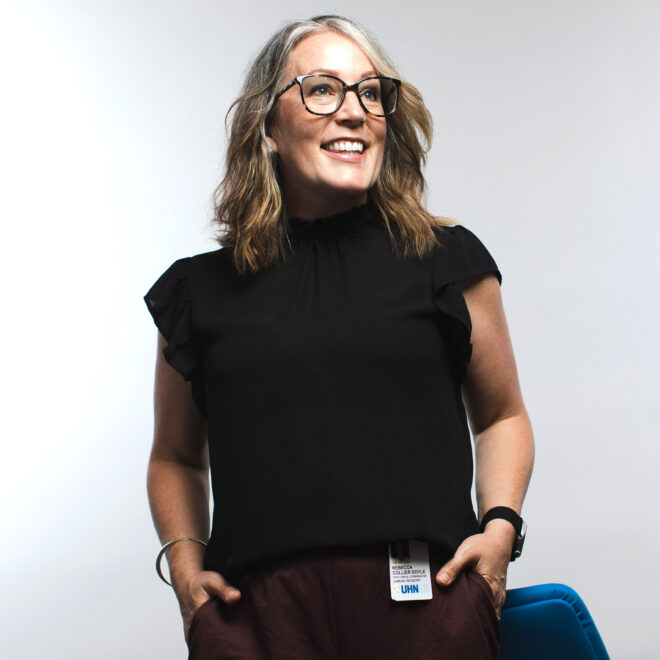
Connie Pillo says the UHN team has saved her life at least five times since 1975.
Tim Fraser
A lifetime of support
Sprott Department of Surgery patients receive care and support long after they’re released.
In the 1970s, Connie Pillo prided herself on her family and active life. With her husband, the 42-year-old was raising four daughters in Toronto; every minute she could spare from family life was spent on the tennis court, playing, teaching and organizing junior tournaments and the ladies’ Windoor League. “I loved tennis,” she says, “but I was always home for lunch and after school, and driving the girls to games or lessons before dinner.”
In 1975, however, her legs began feeling strange. “They wouldn’t take me anywhere anymore,” she recalls. One day the pain became so excruciating, Pillo went to her doctor and was sent to Toronto General Hospital, which is now part of University Health Network (UHN).
Pillo had a severe blockage in her aortic artery – a life-threatening condition. She was admitted to what’s now UHN’s Sprott Department of Surgery for an emergency operation. In an instant, she went from thinking she was generally healthy to signing a waiver that would allow the surgical team to amputate her legs if need be, a devastating turn of events, she says.

This type of blockage causes peripheral artery disease – a kind of vascular disease that impacts blood flow to the legs. Just five per cent of people in their 50s and fewer in their 40s are affected. Fortunately, surgery to create a bypass in her aorta went well. “I was able to resume my life, first and foremost looking after my family and then playing tennis and giving lessons,” Pillo says.
5%
Just 5 per cent of people in their 50s and fewer in their 40s are affected by peripheral artery disease – a kind of vascular disease that impacts blood flow to the legs.
She was told, “If you’re lucky, the bypass will last 10 years,” but it’s endured for 48. However, the operation didn’t put Pillo out of the woods. She still had vascular disease, a condition that impacts the blood vessels – and impacts them for life.
“Vascular disease can affect multiple systems,” says Dr. Graham Roche-Nagle, Interim Head of the Division of Vascular Surgery at the Peter Munk Cardiac Centre, part of the Sprott Department of Surgery at UHN. “It’s not a one-organ disease – it’s a multi-organ disease.”
“When you’re referred a vascular patient, it’s essentially a relationship for life.”
Dr. Graham Roche-Nagle
Indeed, Pillo, who is now 90, has had to return to UHN multiple times over the years, for both vascular issues and other illnesses. She’s had a few stents implanted in one of her main arteries and had a pacemaker inserted into her chest with thorough care from Dr. John Ross at UHN’s Peter Munk Cardiac Centre. She’s also had hernia surgery and received care for gastrointestinal issues, vision loss (Pillo is now legally blind) and more.
UHN’s team, she says, has saved her life at least five times over nearly five decades, largely because her vascular team is always abreast of any treatments and is in regular contact with her other healthcare providers. “These are generally very complex patients,” notes Dr. Roche-Nagle, about people with vascular disease. “Any treatment plan you put in place has to take their other ailments into account.”
Constant caring contact
Patients like Pillo are living longer than ever with vascular disease thanks to breakthroughs like better medications, minimally invasive surgeries and implantable devices. At UHN, they also get a team for life. Clinicians and other medical staff collaborate and discuss treatment plans, especially when it comes to vascular patients.
Sprott surgeons stay in touch with their patients, whether they’re currently going through intensive treatment or not. They also call patients regularly. “During COVID, at least one if not more of mom’s doctors called and talked about the importance of isolating and waiting for vaccines,” says Pillo’s daughter Fran Pillo-Blocka. “Yesterday, the doctor called because she had a tooth extraction and he wanted to see how she was doing.”
“As I’ve gotten older, I still feel like I’m getting the same great care.”
Connie Pillo
This level of care has meant a bit less worry for Pillo-Blocka as she and her sisters, Clare, Lou-Anne and Marie, look out for her mother in her senior years. Pillo herself feels immense gratitude for a long life full of family time and tennis – she now has five grandchildren and six great-grandchildren. “As I’ve gotten older, I still feel like I’m getting the same great care,” says Pillo of her team across UHN. “I wouldn’t be here today if it wasn’t for them.”

